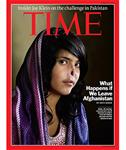What is more shocking - a photo or the story behind it?
Adelina Marini, August 6, 2010
 Is the photo of a a scar-faced woman shocking? Such discussion evoked the cover photo of the TIME MAGAZINE of an Afghani woman, who managed to flee her family, for which she was punished by cutting her nose and ears. The perpetrator was her own husband. I think the discussion is put on the wrong question because the picture itself is not shocking, what is shocking is the deed behind it. Are we gonna sleep with a clean conscience, without seeing the photo but being fully aware that somewhere around the world women are a merchandise - they have no right to vote, no right to have an opinion, no right to be themselves? I think this is the right question.
Is the photo of a a scar-faced woman shocking? Such discussion evoked the cover photo of the TIME MAGAZINE of an Afghani woman, who managed to flee her family, for which she was punished by cutting her nose and ears. The perpetrator was her own husband. I think the discussion is put on the wrong question because the picture itself is not shocking, what is shocking is the deed behind it. Are we gonna sleep with a clean conscience, without seeing the photo but being fully aware that somewhere around the world women are a merchandise - they have no right to vote, no right to have an opinion, no right to be themselves? I think this is the right question.
And in fact, this question is very much contemporary even in the 21st century everywhere. The difference is in the way it is being addressed. Everywhere around the world, including the most developed societies we've heard of cases when a husband would beat his wife, would not let her out alone or, maybe, without demonstrating his superiority, he would feel it deep inside. The more developed nations have found a way to confront this by creating laws, temporary shelters for women, who suffered violence, they spend money on consultations, psychological help for such women, etc.
However, in not that developed countries, especially those where religion itself commands that a woman should not be considered a human, the problem is fundamental.
The photo on the cover of the famous magazine, however, unveils another problem - the one with its title: "What will happen if we leave Afghanistan" (without question mark). The problem with the title is that the US did not go to Afghanistan to guarantee the rights of underprivileged in the first place. They went there after 9/11 because of suspicion that the Taleban were behind the attacks in Washington and New York. And they stayed there because of the data that there are numerous training camps for terrorists in Afghanistan (camps, funded by Al-Qaeda). This was the reason why the US committed to Pakistan too.
The claim of the TIME magazine is that the case with the scarred Aisha happened not 10 years ago when the Taleban ruled Afghanistan, but last year (2009). But this does not necessarily mean that the US should not leave the country because - now you see what will happen. The main problem of the international security forces in Afghanistan (among which Bulgaria too) is to train the army and the police, to start the long and painful process of internal reconciliation and to find consensus on what kind of society to be built. No war can lead to achieving such goals, it can only exacerbate the situation.
In support of the above, the article in the magazine quotes positions of various diplomats, experts, military strategists, according to which reconciliation in this country is possible only through negotiations with the Taleban. However, these negotiations are unlikely to go that deep to be able to create even a far horizon for women like Aisha. It is a fact that there are women in the official government in Afghanistan, but it is also a fact that the Taleban do not recognise the government and would even less get rid of their religious and worldly visions to allow women have rights.
The controversial photo is accompanied by a detailed explanation of the managing editor of the TIME, in which he explains how his team consulted a child psychologist on how this photo would influence children who, no doubt, would see it - at the news stands around the world, on the table in front of the TV at home, in the office of mom and dad. The final decision for the publication of the photo was taken because bad things happen to people and "it is part of our job to confront and explain them". I can agree with the latter but not with the former - why should we assume that Afghan children can watch these things "live", which in fact is forming their visions for their entire life, and "ours" should not?
And why do we put the fragile psyche of our own children from the developed world in a leading position to the more important mission, which is - to confront these problems and explain them? Of course, we should filter when showing the atrocities of war but we should not hide behind "our values" in order to justify our actions or the actions, performed in our name. Ultimately we are those who have to decide, paying through our taxes the foreign policies of our nations, whether what we see on a cover page is what we had expected to change with our taxes.